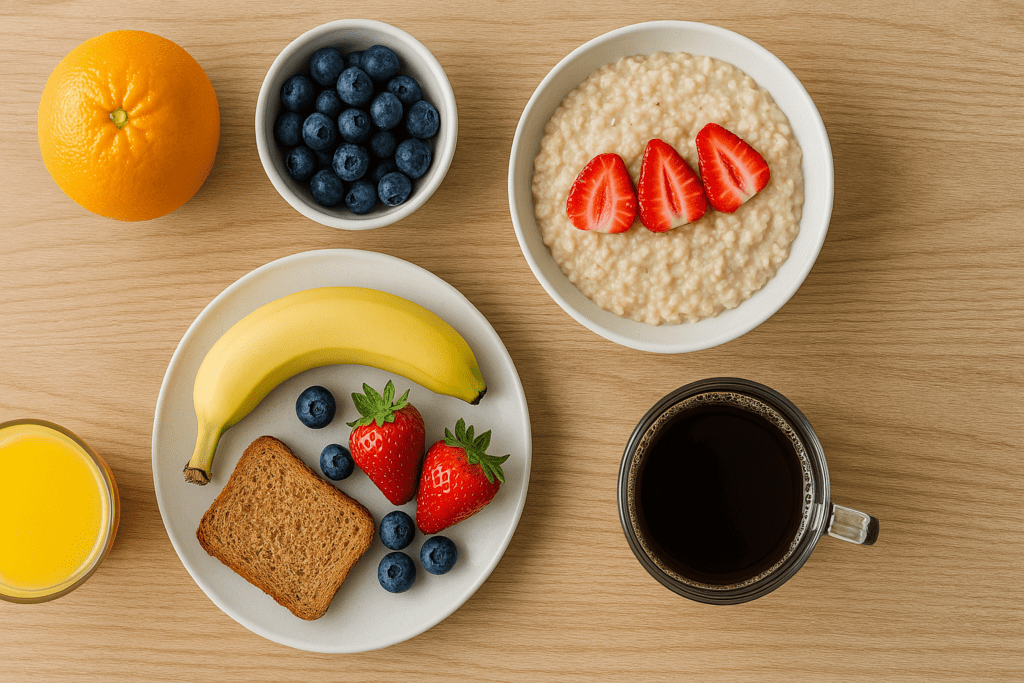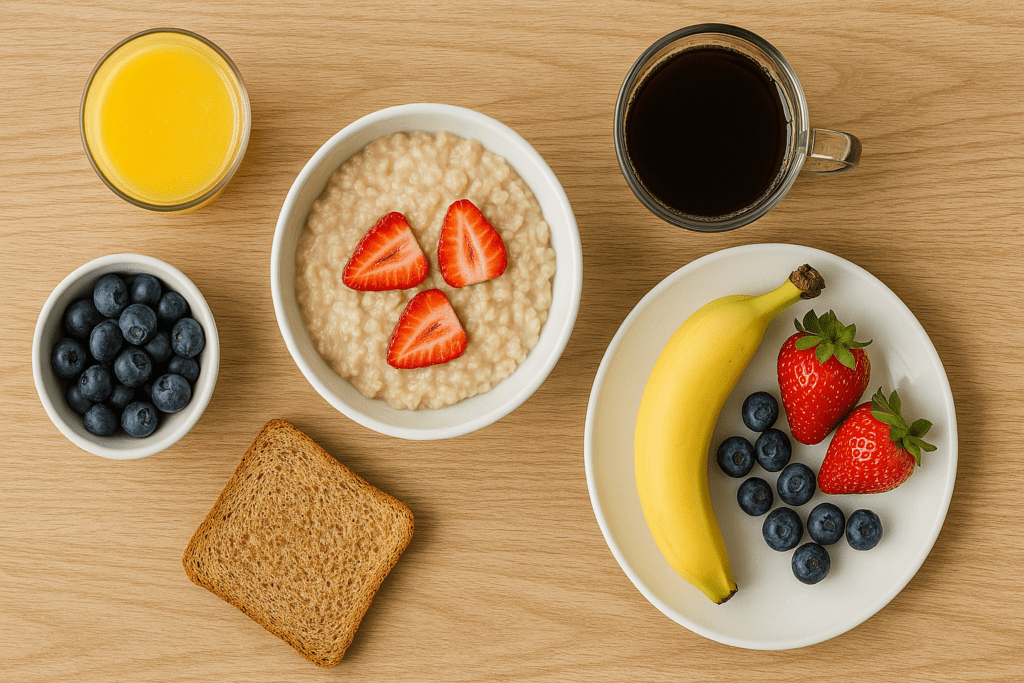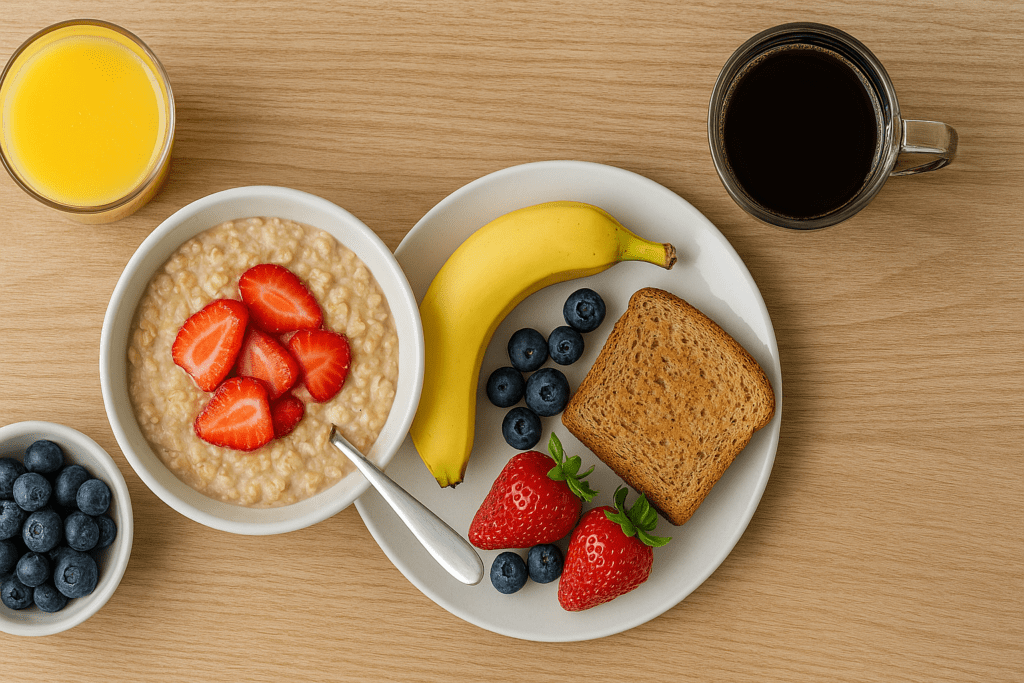In today’s fast-paced world, where professional demands, family responsibilities, and personal health goals often collide, maintaining balanced nutrition is more critical than ever. For a 35-year-old man, the morning meal is not merely a tradition or a quick energy fix; it is a strategic opportunity to support metabolism, cognitive clarity, and disease prevention. A healthy breakfast for a 35-year-old man should be a thoughtful combination of macronutrients and micronutrients tailored to this life stage’s specific metabolic needs, lifestyle patterns, and health objectives. Nutritional science, practical life experience, and expert recommendations converge to underscore the importance of starting the day with intention. This article delves into what constitutes a healthy breakfast for men in their mid-thirties and explores how a nutritious morning routine can profoundly influence long-term wellness.
You may also like: Smart Healthy Eating Tips for Busy Professionals: How to Stay Nourished When You’re Always on the Go
Why Breakfast Matters More at 35
By age 35, the male body undergoes subtle yet significant changes that can alter how it processes food, builds muscle, and manages stress. While metabolic rate gradually begins to decline, many men at this stage are also navigating increased work responsibilities, often coupled with reduced physical activity. These lifestyle changes can lead to gradual weight gain, reduced insulin sensitivity, and shifts in hormonal balance. That’s why a healthy breakfast for a 35-year-old man is more than just a meal; it is a crucial strategy for maintaining lean muscle mass, managing weight, supporting cognitive performance, and reducing the risk of chronic disease. Studies consistently show that individuals who consume a balanced breakfast tend to have better energy levels throughout the day, more stable blood sugar, and improved focus compared to those who skip this meal.
The Foundation of a Balanced Morning Meal
A well-rounded, nutrient-dense breakfast should include a harmonious mix of complex carbohydrates, high-quality protein, healthy fats, and essential vitamins and minerals. The synergy of these components supports not only short-term energy but also long-term health outcomes. For instance, complex carbohydrates such as whole grains provide a sustained release of glucose, which fuels the brain and muscles without causing blood sugar spikes. Meanwhile, protein helps regulate appetite hormones, reduces cravings, and aids in muscle maintenance. Healthy fats, particularly those rich in omega-3 fatty acids, contribute to heart health, cognitive function, and anti-inflammatory effects. When constructing a healthy breakfast for men, particularly those in their mid-thirties, prioritizing foods that offer this balance is essential for achieving optimal metabolic and cognitive outcomes.

Protein: The Cornerstone of a Man’s Morning Nutrition
Protein plays a pivotal role in supporting the body’s repair processes, especially for men in their mid-thirties who may be engaging in strength training or dealing with the natural decline in muscle mass that begins at this age. A breakfast rich in high-quality protein—such as eggs, Greek yogurt, cottage cheese, tofu, or protein-fortified smoothies—can help stabilize blood sugar, reduce late-morning hunger, and enhance satiety throughout the day. Experts recommend that men aim for 20 to 30 grams of protein in the morning, which has been shown to improve muscle protein synthesis and support metabolic health. Incorporating protein into a healthy breakfast for a 35-year-old man can also support testosterone production and enhance cognitive performance, particularly in high-stress work environments where sustained attention and memory recall are essential.
Complex Carbohydrates for Sustained Energy
The days of demonizing carbs are largely behind us, as more research points to the importance of complex carbohydrates in providing steady, long-lasting energy. Whole grains such as oats, quinoa, buckwheat, and whole wheat bread offer dietary fiber, B vitamins, and important minerals like magnesium and selenium. These nutrients support digestion, cardiovascular health, and mental clarity. For a healthy breakfast for men, combining these grains with a protein source ensures a gradual release of glucose into the bloodstream, preventing the energy crashes and cravings that often accompany refined sugar-laden breakfast items. Men at 35, often balancing work and physical activity, benefit significantly from these slow-burning fuel sources that sustain them well into the afternoon.
The Role of Healthy Fats in Morning Meals
Healthy fats are another key component of a balanced breakfast, offering satiety, taste satisfaction, and essential fatty acids that the body cannot synthesize on its own. Avocados, nuts, seeds, and fatty fish like salmon are excellent sources of monounsaturated and polyunsaturated fats that support brain health, hormone production, and cardiovascular function. For a 35-year-old man, incorporating these fats in moderation can also help with the absorption of fat-soluble vitamins such as A, D, E, and K. A classic example of this in action is avocado toast on whole grain bread with a poached egg—a simple yet highly effective breakfast choice that delivers a strong nutritional profile while satisfying modern taste preferences. Embracing healthy fats in a morning meal ensures that a healthy breakfast for a 35-year-old man is both functional and flavorful.
Micronutrients That Matter in Your Mid-Thirties
As men approach their mid-thirties, micronutrient needs become increasingly nuanced. Nutrients such as vitamin D, magnesium, zinc, and B-complex vitamins play essential roles in energy metabolism, immune defense, and psychological resilience. Deficiencies in these nutrients are surprisingly common and can lead to fatigue, mood instability, and decreased physical performance. A healthy breakfast for men at this age should intentionally include food sources rich in these micronutrients. Eggs provide choline and B12, leafy greens contribute folate and magnesium, while fortified cereals or dairy alternatives can offer additional vitamin D and calcium. Taking a food-first approach ensures bioavailability and reinforces healthy dietary habits that can be sustained over time.
Timing, Portioning, and Eating Mindfully
Beyond the ingredients themselves, how and when breakfast is consumed also influences its effectiveness. Eating within 60 to 90 minutes of waking helps align nutrient intake with the body’s natural circadian rhythm, improving metabolic efficiency and hormonal balance. Skipping breakfast or delaying it excessively may result in insulin dysregulation, increased cortisol levels, and impaired concentration. Portion control is equally important—even a healthy breakfast can become counterproductive if consumed in excess. Men should be mindful of hunger and satiety cues, focusing on eating slowly and without distractions. This mindfulness supports better digestion, enhances the enjoyment of food, and contributes to long-term healthy eating behaviors. When paired with nutrient-rich foods, mindful eating transforms a healthy breakfast for a 35-year-old man from a rushed necessity into a cornerstone of wellness.

Customizing Breakfast for Fitness and Activity Levels
Men who lead active lifestyles or engage in regular fitness routines have slightly different breakfast needs than their more sedentary counterparts. For physically active individuals, breakfast serves not only as a source of daily energy but also as a vital component of workout recovery and performance enhancement. Including additional carbohydrates and lean protein can help replenish glycogen stores and support muscle repair. A smoothie made with spinach, banana, Greek yogurt, protein powder, and a spoonful of almond butter is an excellent choice for post-workout recovery. Conversely, men who are more sedentary may benefit from slightly lighter breakfast options that emphasize fiber, hydration, and moderate caloric intake. In either case, the key is customization. A healthy breakfast for men should be adaptable to individual goals, schedules, and physiological demands.
Addressing Common Breakfast Pitfalls
Despite growing awareness about nutrition, many men continue to fall into common breakfast traps that undermine their health goals. These include consuming overly processed foods high in sugar, relying on caffeine as a substitute for food, skipping breakfast altogether, or eating too little to provide adequate fuel. Breakfast cereals marketed as “healthy” often contain more sugar than a dessert, while breakfast sandwiches from fast-food establishments may be packed with sodium and unhealthy fats. Avoiding these pitfalls requires a shift in mindset: viewing breakfast not as a chore, but as an investment. A well-prepared healthy breakfast for a 35-year-old man does not need to be elaborate—even a simple bowl of oatmeal topped with nuts and berries or a boiled egg with whole grain toast can deliver significant benefits when consumed consistently.
Meal Prep Strategies for Busy Mornings
Time constraints are a frequent barrier to eating a nutritious breakfast, especially for men juggling demanding schedules. However, with a bit of foresight and planning, it is entirely feasible to prepare balanced meals that are both quick and satisfying. Overnight oats, egg muffins, smoothie packs, and pre-portioned yogurt parfaits are all examples of breakfast options that can be prepared in advance and enjoyed with minimal effort. Investing time on a Sunday evening to plan and prep breakfast for the week can remove decision fatigue and make healthy choices the default. For those working from home, batch cooking options like quinoa breakfast bowls or savory vegetable frittatas can provide variety and ease. Ultimately, the goal is to make the healthiest choice the most convenient one, reinforcing consistency and reducing reliance on less nutritious alternatives.
Understanding the Psychological Impact of a Healthy Breakfast
Emerging research also points to the psychological benefits of a nutritious morning meal. A balanced breakfast has been linked to improved mood, reduced irritability, and lower levels of stress throughout the day. This is particularly relevant for men in their mid-thirties, who may be balancing career progression, family obligations, and financial responsibilities. The act of taking time to nourish oneself in the morning can foster a sense of self-efficacy, discipline, and stability. Furthermore, consistent routines that include a healthy breakfast have been associated with improved sleep patterns, better impulse control, and enhanced emotional regulation. These psychological benefits underscore that a healthy breakfast for a 35-year-old man is not only about physical wellness but also about mental resilience and emotional clarity.
Cultural and Social Influences on Breakfast Choices
Cultural background, family traditions, and societal norms also influence what men choose to eat in the morning. While Western breakfast options often emphasize cereals, toast, and eggs, many global traditions offer nutrient-rich alternatives that are equally beneficial. For instance, traditional Japanese breakfasts include fish, miso soup, and rice; Mediterranean breakfasts may feature olives, tomatoes, and whole grain flatbreads; Indian breakfasts often incorporate lentils, vegetables, and fermented grains. These cultural variations can offer inspiration and diversity, allowing men to discover new ways to enjoy a healthy breakfast while honoring their heritage or exploring new culinary experiences. Integrating these influences can make a healthy breakfast for men more enjoyable and sustainable by preventing monotony and broadening the palate.
The Role of Supplements in a Complete Breakfast
While whole foods should always be the foundation of any diet, certain supplements can enhance breakfast nutrition, especially when dietary gaps are present. A high-quality multivitamin, omega-3 fish oil, or a probiotic may be appropriate depending on individual health goals and needs. However, supplements should not be viewed as replacements for a balanced diet. Consulting a healthcare provider or registered dietitian can help determine whether supplementation is necessary and safe. For a 35-year-old man, integrating appropriate supplements into a healthy breakfast routine can help support long-term wellness, but only when used judiciously and in conjunction with nutrient-dense foods. When paired responsibly, supplements can serve as a supportive tool in an already robust nutritional plan.

Reflections on Building Lasting Breakfast Habits
Developing and maintaining a consistent morning routine is a powerful strategy for promoting overall health. This process involves not only choosing the right foods but also creating rituals that foster consistency, enjoyment, and mindfulness. Whether it is enjoying a quiet cup of coffee with whole grain toast and avocado or sitting down with the family for a shared meal, these habits create a positive feedback loop that reinforces healthy behaviors. Over time, a healthy breakfast for a 35-year-old man becomes more than a dietary decision; it becomes a lifestyle choice that influences energy levels, mental sharpness, emotional well-being, and even social connections. By aligning one’s morning routine with both nutritional science and personal values, breakfast transforms into a powerful catalyst for lifelong health.
Frequently Asked Questions (FAQ) on Healthy Breakfast for a 35-Year-Old Man
What are some advanced strategies for optimizing nutrient absorption during breakfast?
While food quality is foundational, nutrient absorption can be optimized through mindful timing and pairing. For instance, consuming vitamin C-rich fruits like kiwi or oranges alongside plant-based iron sources (like spinach or oats) can significantly enhance iron absorption. Similarly, pairing healthy fats with fat-soluble vitamins such as vitamin D or A ensures better bioavailability, which is essential in a healthy breakfast for a 35 year old. Some probiotics found in yogurt or kefir may also improve digestion and micronutrient assimilation, especially in men who experience gut health issues. Rotating breakfast components seasonally and minimizing nutrient-blocking compounds like excess caffeine or processed fiber supplements during meals can further enhance the impact of a healthy breakfast for men.
How does sleep quality influence morning dietary needs for men in their mid-thirties?
Sleep duration and quality can profoundly impact morning hunger cues, glucose regulation, and nutrient needs. After a poor night’s sleep, cortisol levels tend to rise, leading to cravings for sugary or carb-heavy foods. In such cases, prioritizing protein and fiber at breakfast can help stabilize blood sugar and restore satiety signals. A healthy breakfast for a 35 year old might also include magnesium-rich foods like pumpkin seeds or leafy greens to support stress reduction and nervous system balance. Understanding this sleep-nutrition connection can inform more adaptive and responsive choices in creating a healthy breakfast for men who often face variable sleep patterns due to work or parenting.
What role does mental health play in shaping breakfast routines and preferences?
Mental health not only influences food choices but can also shape breakfast timing, preparation habits, and appetite regulation. Men experiencing chronic stress, depression, or anxiety may either skip breakfast or opt for hyper-palatable foods that offer short-term comfort but undermine long-term wellness. Incorporating omega-3 rich options like flaxseeds, walnuts, or fatty fish can support mood regulation as part of a healthy breakfast for men. Additionally, preparing a simple meal the night before can ease morning overwhelm, making it more likely for someone struggling with low motivation to adhere to a healthy breakfast for a 35 year old. Practicing mindfulness during meals may also reframe breakfast as an act of self-care rather than a task to rush through.
Are there functional foods that go beyond nutrition to support performance and cognition?
Yes, several functional foods provide benefits that extend beyond basic nourishment, targeting brain health, stamina, and hormonal balance. Adaptogens such as maca root or ashwagandha, when added to smoothies or oatmeal, may help support energy and resilience. Choline-rich foods like eggs aid memory and cognitive processing, making them valuable in a healthy breakfast for men who face intellectually demanding workdays. Nitrate-rich greens like arugula or beetroot can enhance blood flow, which may support both cardiovascular performance and mental clarity. Including these performance-enhancing ingredients can elevate a healthy breakfast for a 35 year old from adequate to exceptional.
What long-term impacts can consistent breakfast habits have on metabolic aging?
Establishing consistent, high-quality breakfast habits in one’s mid-thirties can shape how the body metabolizes nutrients, regulates weight, and maintains energy as it ages. Regular morning meals that are balanced and nutrient-rich have been shown to improve insulin sensitivity and reduce inflammation—two key markers of metabolic aging. A healthy breakfast for a 35 year old can also promote stable cortisol rhythms, supporting hormonal balance over time. Moreover, these consistent practices may help preserve lean muscle mass and cognitive vitality into the forties and beyond. This cumulative effect highlights how a healthy breakfast for men is not just a daily routine, but a long-term wellness investment.
How can technology assist in maintaining consistent and healthy breakfast habits?
Digital tools like nutrition tracking apps, smart kitchen gadgets, and wearable devices can play a role in creating accountability and structure. Meal planning apps with built-in macronutrient calculators help tailor breakfast options to individual energy and fitness needs. A healthy breakfast for men can be prepped more efficiently with tools like programmable blenders, egg cookers, or even meal-delivery subscriptions tailored for men’s health. Wearables that monitor sleep and activity can offer insights into how breakfast impacts daily performance, making adjustments easier. By integrating technology into morning routines, maintaining a healthy breakfast for a 35 year old becomes more accessible and sustainable.
What are the psychological effects of skipping breakfast in men over 30?
Skipping breakfast can lead to more than just mid-morning hunger. Research shows that it may impair mood, reduce concentration, and increase perceived stress, especially in men managing busy or high-stakes careers. A healthy breakfast for men acts as both a physiological stabilizer and a psychological anchor, offering predictability and nourishment. Chronic breakfast skipping may also be linked to irregular eating behaviors later in the day, potentially disrupting long-term weight management and emotional regulation. Thus, a consistent healthy breakfast for a 35 year old can be a subtle yet powerful mental health strategy.
How can men adapt breakfast during periods of intermittent fasting or time-restricted eating?
For men practicing intermittent fasting, breakfast may occur later in the day but should still meet the same quality standards. When breaking a fast, it’s essential to reintroduce nutrients gently—starting with easily digestible foods like smoothies with protein, healthy fats, and fiber. Whether eaten at 7 a.m. or noon, a healthy breakfast for a 35 year old should provide sustained energy and avoid insulin spikes. Men should also be mindful of hydration and electrolyte balance during fasting, especially if physical activity is involved. Even within time-restricted windows, maintaining a healthy breakfast for men ensures metabolic stability and optimal nutrient utilization.
Are there unique considerations for plant-based men planning a high-performance breakfast?
Absolutely. Plant-based men need to be especially strategic about protein quality, B12 intake, and essential fatty acids. Including a variety of legumes, seeds, fortified plant milks, and whole grains ensures completeness and nutrient density. A smoothie with pea protein, chia seeds, almond butter, and berries exemplifies a high-performance, plant-based healthy breakfast for men. Since vitamin B12 is not naturally found in plant foods, supplementation or fortified cereals may be necessary. For a healthy breakfast for a 35 year old following a vegan or vegetarian lifestyle, focusing on nutrient synergy and intentional meal structure is key to achieving optimal results.
How can cultural traditions enhance the nutritional value and variety of breakfast?
Cultural breakfast traditions often include time-honored combinations that naturally balance flavor and nutrition. For example, Middle Eastern breakfasts featuring hummus, olives, and whole grain flatbreads deliver fiber, healthy fats, and plant-based protein. Exploring global influences can help reframe the idea of what constitutes a healthy breakfast for men, moving beyond the Western cereal-and-toast paradigm. Incorporating international elements also makes a healthy breakfast for a 35 year old more exciting and sustainable by reducing monotony. By embracing culinary diversity, men can align their morning meals with both personal identity and evolving health goals.
The Bottom Line: Why a Healthy Breakfast for Men at 35 Is an Investment in the Future
Ultimately, a healthy breakfast for a 35-year-old man is far more than a meal; it is an investment in both the present and the future. At this pivotal age, the body begins to send subtle signals about aging, recovery, and resilience. The choices made at the breakfast table can either support or undermine these natural transitions. From improved metabolic health and hormonal balance to sharper mental focus and emotional regulation, the benefits of a nutritious morning routine are profound and multifaceted. By prioritizing high-quality protein, complex carbohydrates, healthy fats, and vital micronutrients, men can set the tone for a productive day and lay the foundation for long-term wellness. With mindful planning, cultural appreciation, and a willingness to experiment with diverse foods, crafting a healthy breakfast for men at 35 becomes an empowering daily act of self-care and strategic health management.
morning nutrition for men, balanced diet for energy, men’s health and wellness, best foods for focus, breakfast meal planning, high protein morning meals, whole grain breakfast ideas, heart-healthy breakfast options, metabolism boosting foods, anti-inflammatory breakfast, micronutrient-rich meals, brain food for adults, healthy fats for men, mindful eating habits, nutrient timing strategies, fitness nutrition tips, men’s diet after 30, building healthy routines, foods that support testosterone, long-term health strategies
Further Reading:
10 Best Healthy Breakfast Foods to Eat
The 12 Best Breakfast Foods to Eat in the Morning
Disclaimer
The information contained in this article is provided for general informational purposes only and is not intended to serve as medical, legal, or professional advice. While NewsHealthWatch strives to present accurate, up-to-date, and reliable content, no warranty or guarantee, expressed or implied, is made regarding the completeness, accuracy, or adequacy of the information provided. Readers are strongly advised to seek the guidance of a qualified healthcare provider or other relevant professionals before acting on any information contained in this article. NewsHealthWatch, its authors, editors, and contributors expressly disclaim any liability for any damages, losses, or consequences arising directly or indirectly from the use, interpretation, or reliance on any information presented herein. The views and opinions expressed in this article are those of the author(s) and do not necessarily reflect the official policies or positions of NewsHealthWatch.

